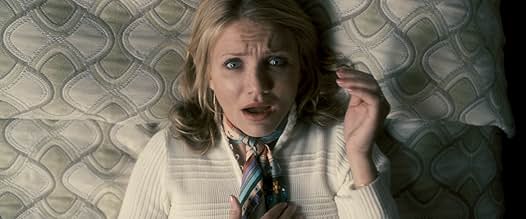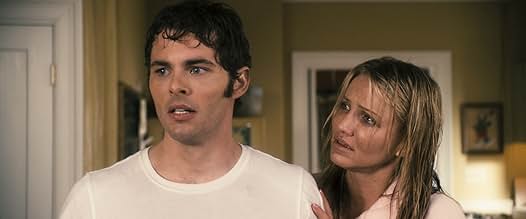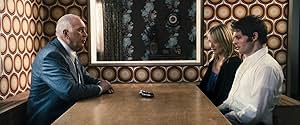The Box
- 2009
- Tous publics
- 1h 55min
Une petite boîte en bois arrive sur le pas de la porte d'un couple marié, le couple sait qu'en l'ouvrant, ils obtiendront un million de dollars mais viendront tuer quelqu'un qu'ils ne connai... Tout lireUne petite boîte en bois arrive sur le pas de la porte d'un couple marié, le couple sait qu'en l'ouvrant, ils obtiendront un million de dollars mais viendront tuer quelqu'un qu'ils ne connaissent pas.Une petite boîte en bois arrive sur le pas de la porte d'un couple marié, le couple sait qu'en l'ouvrant, ils obtiendront un million de dollars mais viendront tuer quelqu'un qu'ils ne connaissent pas.
- Réalisation
- Scénario
- Casting principal
- Récompenses
- 1 victoire et 6 nominations au total
- Martin Teague
- (as Mark Cartier)
Avis à la une
The performances from James Marsden and Cameron Diaz are superb. Marsden is very good, but Diaz is the one who steals the show, surprisingly. I never have respected Diaz as an actress before, and when I heard her southern accent in the trailer I got very worried. But her accent, and her performance, elevate the film even more, and she was very strong. I should now give her the credit she deserves. Frank Langella is very creepy and mysterious, and his character has classic Kelly printed all over it. The cinematography is great. The music score, although by itself is great, was used too loud and too dramatized in some scenes, and was a distraction. But overall, The Box is another very interesting and very dreamy film from Richard Kelly, one that as years go by, will be sitting comfortably with Donnie Darko and Southland Tales on my DVD shelf.
Metaphorically, the box refers to how us humans tend to subconsciously hole ourselves into situations or things in everyday life, and how our enclosed thoughts tend to see things from a certain perspective, seldom out of the box. There's a speech made near the end by one of the characters that will leave you pondering over this fact, which governs the basis of the entire film, and even threading on existentialism, where our bodies are mere vessels for the soul, and from cradle to the grave we put ourselves in more boxes in a way of life fashion.
What I disliked about the film, is how it tried to sound intelligent through the frequent name dropping of covert government agencies like the CIA and NSA, as though there's something overtly clandestine about these agencies that we should be aware of. They serve little purpose other than to put every action and every person under scrutiny, that nobody can be trusted, wrecking havoc in a sense to both the characters and the audience as we try to keep up with trust issues to aid in the interpretation of the narrative. Having it set in 1976, against a NASA backdrop of manned space missions, and in Langley, Virginia, also provided that heightened sense of wary that will sap your energies as you sit through it patiently.
Based upon the short story Button, Button written by Richard Matheson and made into an episode of the Twilight Zone, the story follows the Lewis family, where husband Arthur (James Marsden) works at NASA and develops a prosthetic foot for his teacher wife Norma (Cameron Diaz), and you'd think it's all happy family with their son Walter (Sam Oz Stone), until one day a mysterious man called Arlington Steward (Frank Langella in a Two-Face inspired facial effect) whom we are preempted of in the opening, comes knocking and giving them a Deal or No Deal button in a box. Plunge the button and they'll get a million bucks (we're talking in dollar terms of the 70s here) although a stranger out there will die. If they don't, well the deal's got an expiry date.
The story would dictate a deal be made, which of course sparks off a mysterious sequence of events that unfold, with even more shady characters (who nosebleed) appearing, some whom are inexplicably zombie like, apparently all under the influence, or employment, or Arlington Steward. Whether or not Steward is Death, a clandestine government employee, a messenger from God or a representative of Aliens after an anal probe, remains unanswered, so whichever way you look at it, it's as if he's delivering something expected, just begging that mankind will shake off its innate greed so that his work can be cut short and to return to wherever he came from.
If you need a little distraction from the disparate scenes which make up the narrative, the production sets and art direction are gorgeous in recreating the 70s look, as you try to figure out the mystery of the consequences that stem from a result of not fully understanding the fine print. It's full circle this examination of human nature, of our greed for immediate gratification, manifesting its result in longer term pain, confusion and further choices that we'll make based on real sacrifices. Nifty special effects come into play as well, though it just leaves more room open as to the genre of the film.
So is it horror, science fiction, or a mystery thriller? It's everything rolled into one actually, together with a sprinkling of the philosophical. Just don't go expecting a straight narrative film with clean and easy answers at the end – this is like an X-Files episode on steroids.
With any story this daring, there's potential for something meaningful. "The Box" does let you glimpse it and draw a few interesting conclusions, but through intellectual jail bars placed before our eyes by the myriad of plot contrivances. In other words, too many plot elements exist in in the film that keep us from ever putting our mind around what Kelly is trying to say. Although he starts simply by focusing on a couple (James Marsden and Cameron Diaz) and their child making an ethical decision, the scope widens to include everything from Arthur C. Clarke references to mindless drones to some indiscernible notion of the afterlife.
This beginning piece is based on Richard Matheson's story "Button, Button," which was a short story turned into a "Twilight Zone" episode. In "The Box," a mysterious man with a half-burned face played by Frank Langella drops off a box with a button in it at the doorstep of Norma and Arthur Lewis and their son Walter. He later comes back and gives Norma a proposition: don't press the button and nothing happens, or press the button and receive one million dollars and subsequently someone, anywhere in the world, whom they don't know will die.
Well, Norma, a teacher, just lost her teacher tuition discount for her son and Arthur's application to be an astronaut was just denied and despite living in a nice looking house in Richmond, Virginia they apparently have no money, so it's not hard to figure out ultimately what they'll do. After all, don't press the button and there's no film -- not that some people who sit through this would've minded that in retrospect.
As with his cult hit "Donnie Darko," Kelly keeps "The Box" fascinatingly creepy. It starts with the colors, the classic string soundtrack from the band Arcade Fire and some peculiar Easter eggs and moves on to more jarring occurrences. There is never a point where things get so absurd that you don't care what happens in the end, even if there's a chance the end could be terribly unsatisfying. It's one of few saving graces for "The Box," but perhaps even this is only for those intrigued by high concept sci-fi mystery that parallels human nature no matter how vague.
When any thriller collapses somewhere after the midway point, you can usually blame the fact that too many occurrences in need of explaining were written in order for the writer to achieve his desired end. When James Marsden gets hit in a car by a truck and comes out of a giant light warehouse and that ultimately never gets explained, its degrading to the viewer.
The real trouble with "The Box" is how ambitiously it tries to combine the ideas of intelligent life/space exploration with religious notions of life, death and what might come after as well as numerous other elements too many and too difficult to explain. Kelly found that balance between time travel and inter-relationship drama in "Donnie Darko" but "The Box" implodes on itself by severing its little social experiment from the characters with too much unexplained phenomena.
~Steven C
Visit my site http://moviemusereviews.com
Le saviez-vous
- AnecdotesThe main characters, Norma Lewis and Arthur Lewis, were based on director Richard Kelly's parents. His mother also suffered a crippled foot after an X-Ray mishap; his father worked for NASA and co-designed the camera used on the Viking Mars Landers (as in the movie).
- Gaffes911 emergency services weren't available in Richmond, VA, in 1976.
- Citations
Martin Teague: Sir? If you don't mind my asking... why a box?
Arlington Steward: Your home is a box. Your car is a box on wheels. You drive to work in it. You drive home in it. You sit in your home, staring into a box. It erodes your soul, while the box that is your body inevitably withers... then dies. Whereupon it is placed in the ultimate box, to slowly decompose.
Martin Teague: It's quite depressing, if you think of it that way.
Arlington Steward: Don't think of it that way... think of it as a temporary state of being.
- Bandes originalesLight in Your Eyes
Written by Stephan Sechi (as Stephan M. Sechi)
Performed by Stephan Sechi
Courtesy of Crucial Music Corporation
Meilleurs choix
- How long is The Box?Alimenté par Alexa
Détails
- Date de sortie
- Pays d’origine
- Site officiel
- Langue
- Aussi connu sous le nom de
- La caja
- Lieux de tournage
- Sociétés de production
- Voir plus de crédits d'entreprise sur IMDbPro
Box-office
- Budget
- 30 000 000 $US (estimé)
- Montant brut aux États-Unis et au Canada
- 15 051 977 $US
- Week-end de sortie aux États-Unis et au Canada
- 7 571 417 $US
- 8 nov. 2009
- Montant brut mondial
- 33 334 176 $US
- Durée1 heure 55 minutes
- Couleur
- Mixage
- Rapport de forme
- 2.35 : 1
Contribuer à cette page






































